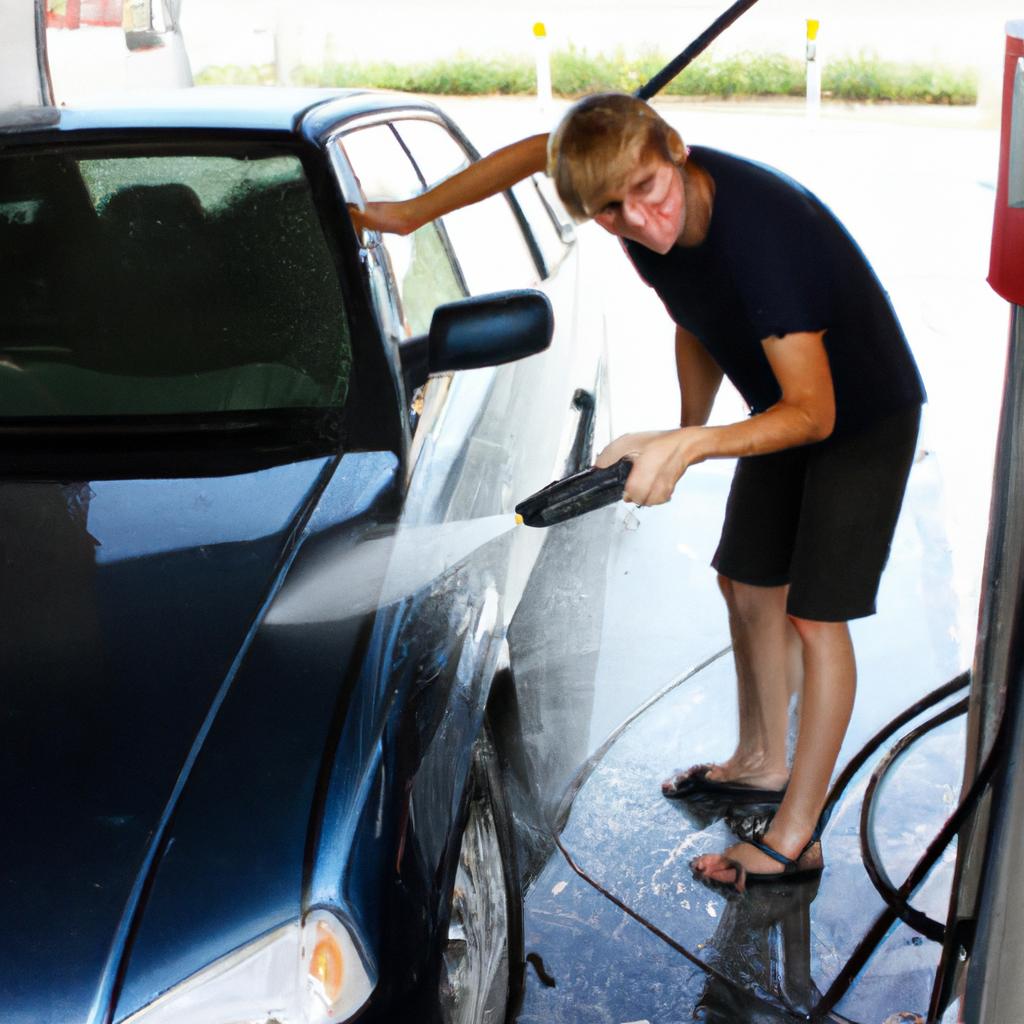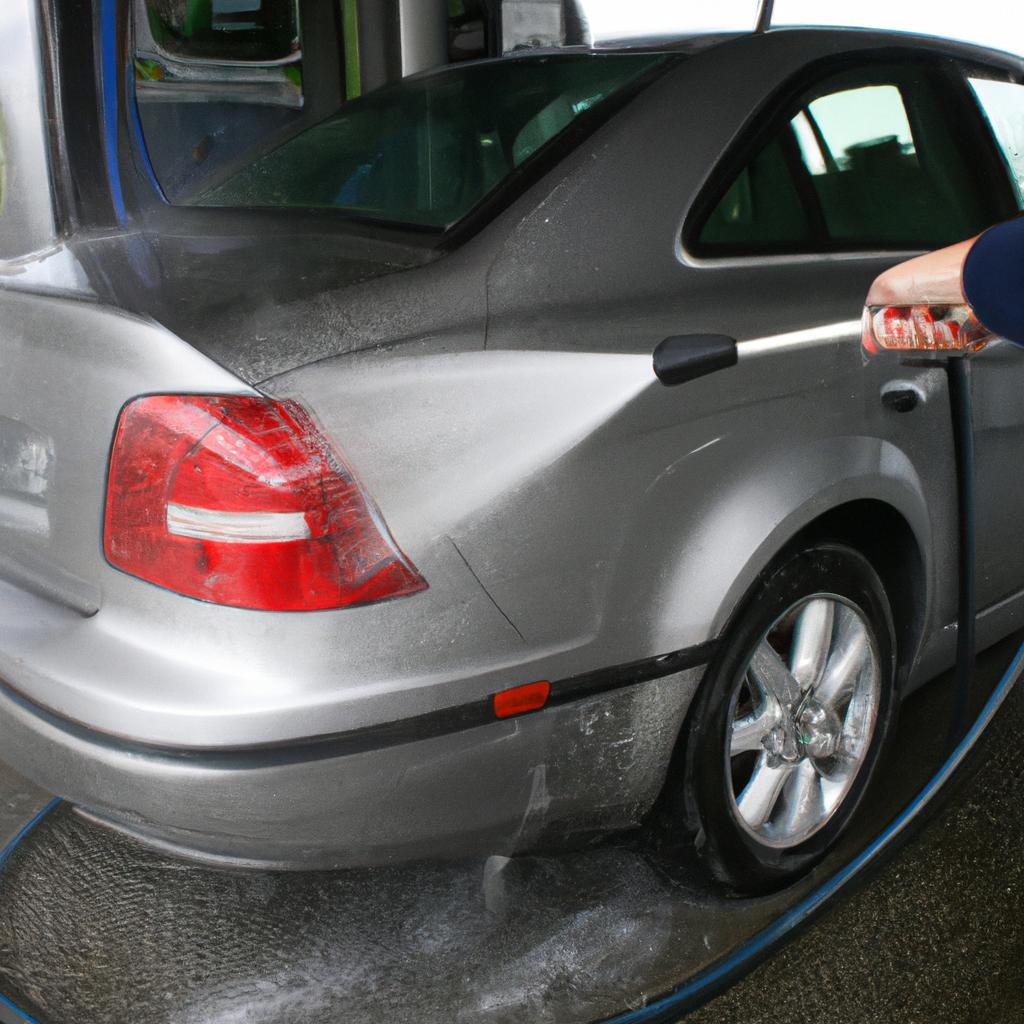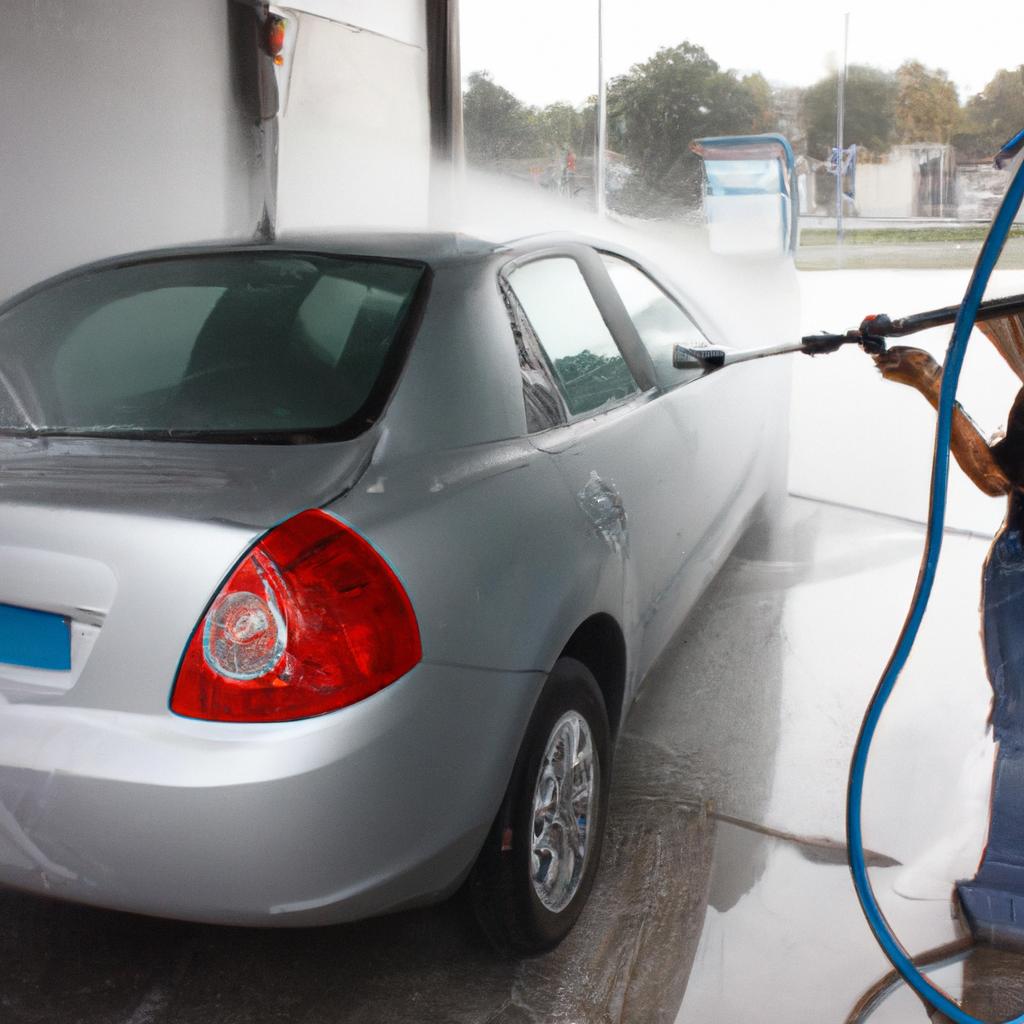Water usage in car washes has been a topic of concern due to its significant environmental impact. The excessive use of water, coupled with the potential for chemical contamination, poses a threat to local ecosystems and groundwater reserves. In order to address this issue, self-serve bays have emerged as an alternative solution that allows car owners to take control of their own water consumption during the cleaning process. For instance, consider a hypothetical scenario where a car owner utilizes a traditional automatic car wash facility that consumes 100 gallons of water per vehicle. By contrast, if they were to opt for a self-serve bay, they would only utilize approximately 30 gallons of water on average.
The concept behind self-serve bays is simple yet revolutionary. Car owners are provided with the necessary equipment and supplies to clean their vehicles themselves while having full control over the amount of water used. This not only empowers individuals to make more environmentally conscious choices but also offers them a sense of satisfaction by actively participating in the preservation of our natural resources. Furthermore, self-serve bays often incorporate additional features such as high-pressure sprayers and adjustable nozzles that allow users to efficiently remove dirt and grime from hard-to-reach areas without wasting excess water. As a result , self-serve bays can significantly reduce water consumption in car washes while still providing an effective cleaning experience for car owners.
Water conservation methods in self-serve car washes
Water conservation is a critical aspect of self-serve car wash operations. With the increasing global focus on sustainability, it has become imperative for businesses in various industries to adopt environmentally friendly practices. In the context of car washes, water usage is a significant concern due to its potential impact on both the environment and operating costs.
A compelling example of water conservation methods in self-serve car washes can be seen in the case study of Clean Wash Inc., located in a suburban area with limited access to freshwater resources. Facing this challenge, Clean Wash Inc. implemented several innovative strategies to minimize water consumption while maintaining high-quality service standards. These methods included the installation of advanced filtration systems, which allowed for efficient recycling and reuse of water within their facility.
To further emphasize the importance of water conservation in self-serve car washes, consider the following bullet points:
- Conserving water reduces strain on local freshwater sources.
- Implementing sustainable practices enhances public perception and builds customer loyalty.
- Decreased water usage leads to cost savings by reducing utility bills.
- Environmental regulations may require businesses to adhere to specific water usage limits.
In addition to these considerations, it is crucial for self-serve car wash operators to understand how different equipment choices affect their overall environmental impact. The table below provides an overview of three commonly used types of car wash equipment and their respective average monthly water consumption rates:
| Equipment Type | Average Monthly Water Consumption (gallons) |
|---|---|
| Traditional Car Wash | 15,000 – 20,000 |
| Water Recycling System | 5,000 – 8,000 |
| High-Efficiency System | 2,500 – 4,000 |
As illustrated above, investing in high-efficiency or water recycling systems can significantly reduce water consumption compared to traditional setups. This information serves as a clear reminder that choosing appropriate equipment is a crucial step towards achieving water conservation goals in self-serve car washes.
By implementing water conservation methods and selecting water-efficient car wash equipment, businesses can benefit both economically and environmentally. In the subsequent section, we will explore the various advantages of using such equipment and how it contributes to long-term sustainability efforts in the industry.
Benefits of using water-efficient car wash equipment
Water conservation methods in self-serve car washes have become increasingly important due to the growing concerns over water scarcity and environmental impact. By adopting efficient practices and utilizing water-saving equipment, car wash owners can significantly reduce their water consumption while still providing effective cleaning services. To illustrate the potential benefits of such measures, let’s consider a hypothetical case study.
Imagine a self-serve car wash located in a region with limited access to freshwater resources. This facility takes proactive steps to conserve water by implementing various strategies:
-
Water recycling: The car wash installs a sophisticated water recycling system that collects and treats used wash water for reuse. This process involves filtration and treatment techniques that remove contaminants, allowing the recycled water to be utilized again during subsequent wash cycles.
-
High-pressure nozzles: In place of traditional spray nozzles, high-pressure variants are used to achieve superior cleaning results using less water. These specialized nozzles produce strong streams of pressurized water that effectively remove dirt and grime without excessive wastage.
-
Timed shut-off valves: Automatic shut-off valves are installed on each bay’s hose connection, ensuring that water flow is controlled when not actively being used by customers. This prevents unnecessary waste during vehicle prep or other non-washing activities.
-
Education and signage: Clear instructional signs are prominently displayed throughout the facility, informing customers about the importance of conserving water and encouraging them to follow recommended washing procedures for optimal efficiency.
To further emphasize the significance of these efforts, let’s take a closer look at how much water can be saved through their implementation:
| Water Conservation Method | Annual Water Savings |
|---|---|
| Water recycling system | 100,000 gallons (378,541 liters) |
| High-pressure nozzles | 30% reduction in overall usage |
| Timed shut-off valves | 15% reduction in overall usage |
| Education and signage efforts | Positive behavioral impact |
By adopting these water conservation methods, our hypothetical car wash could potentially save a significant amount of water annually. This not only benefits the environment but also demonstrates a responsible approach to resource management.
In the subsequent section, we will explore efficient water management techniques specifically designed for self-serve bays. These strategies go beyond general conservation methods and focus on optimizing water use within the context of self-service operations.
Efficient water management techniques for self-serve bays
Water Usage in Car Wash: Self-Serve Bay Insights
Now, let us delve deeper into efficient water management techniques for self-serve bays. To illustrate these techniques, consider a hypothetical scenario where a car wash business implemented various strategies to reduce water consumption.
In this case study, XYZ Car Wash installed water-saving nozzles and timers on their self-serve bay stations. By doing so, they were able to control the amount of water used during each wash cycle. This simple change led to significant reductions in water waste while still ensuring effective cleaning results.
There are several other techniques that can be employed to enhance water management in self-serve bays:
- Water Recycling Systems: Implementing advanced filtration systems allows for the reuse of graywater generated during washing processes, minimizing overall water consumption.
- Rainwater Harvesting: Collecting rainwater from roof structures or dedicated storage tanks offers an alternative supply source for non-potable uses like vehicle rinsing.
- Educating Customers: Display signage and provide information about responsible water usage practices to raise awareness among customers and encourage them to adopt conservation measures.
- Regular Maintenance: Ensuring proper maintenance of equipment such as hoses, valves, and spray nozzles helps prevent leaks and reduces unnecessary wastage.
To make further sense of the impact of these techniques, let’s take a look at the following table showcasing potential water savings achieved by implementing efficient water management strategies:
| Technique | Potential Water Savings |
|---|---|
| Water-saving nozzles | 30% reduction |
| Timers | 20% reduction |
| Water recycling systems | 50% reduction |
| Rainwater harvesting | 40% reduction |
By adopting these methods, XYZ Car Wash was able to reduce its total monthly water consumption by an impressive 40%, leading to significant cost savings and environmental benefits.
In the upcoming section, we will explore helpful tips for minimizing water waste during car washes. Implementing these strategies can further enhance the efficiency of self-serve bays while promoting responsible water usage practices among customers.
Tips for minimizing water waste during car washes
Efficient water management techniques for self-serve bays play a crucial role in minimizing water waste during car washes. By implementing these techniques, car wash owners can not only reduce their environmental impact but also save on costs associated with excessive water usage. To illustrate the importance of efficient water management, let’s consider a hypothetical case study involving a self-serve car wash business located in a water-scarce region.
In this scenario, the car wash owner decides to implement several measures aimed at reducing water consumption without compromising the quality of service provided to customers. Firstly, they install high-pressure nozzles that utilize less water while still being effective in cleaning vehicles thoroughly. Additionally, the owner invests in advanced recycling systems that filter and treat wastewater for reuse within the facility, thus significantly decreasing overall water demand.
The benefits of employing efficient water management techniques are evident when comparing the hypothetical car wash’s performance before and after implementing these measures:
- Water Consumption: Before – 800 gallons per day; After – 400 gallons per day
- Cost Savings: Before – $1,200 per month; After – $600 per month
- Environmental Impact: Before – High; After – Reduced due to decreased freshwater extraction
- Customer Satisfaction: Before – Moderate (due to long wait times); After – Improved (thanks to faster service)
By adopting an environmentally-conscious approach through efficient water management, car wash businesses can reap multiple benefits. Not only do they contribute towards conserving precious natural resources like freshwater but also enhance their own profitability by reducing operational expenses.
Considering the positive outcomes highlighted above, it is clear that implementing efficient water management practices is not only beneficial from an ecological standpoint but also economically advantageous for self-serve car wash establishments. However, further steps can be taken to ensure even greater reduction in water waste and its subsequent impact on the environment.
Impact of water usage on the environment
Water usage in car washes is a significant concern due to its potential impact on the environment. As discussed earlier, minimizing water waste during car washes is crucial for sustainable practices. Now, let’s delve deeper into the actual environmental consequences of excessive water consumption in this industry.
To illustrate the magnitude of the issue, consider a hypothetical scenario where a self-serve car wash facility uses an average of 50 gallons (189 liters) of water per vehicle. With hundreds or even thousands of cars being washed daily at such facilities across the country, it becomes evident that substantial amounts of freshwater are being consumed solely for cosmetic purposes. This raises concerns about resource depletion and disrupts local ecosystems dependent on these water sources.
The ecological implications extend beyond mere water usage. Excessive runoff from car wash sites can lead to contamination of nearby bodies of water with chemicals such as detergents, oils, heavy metals, and microplastics. These pollutants have detrimental effects on aquatic organisms and their habitats. Additionally, wasteful water practices contribute to greenhouse gas emissions through energy consumption required for pumping and heating large volumes of water.
Understanding the gravity of this problem compels us to take action towards more responsible water management within the car wash industry. Here are some key points to highlight:
- Utilizing high-pressure nozzles: By using high-pressure nozzles instead of traditional spray guns, less overall water volume is needed while still achieving satisfactory cleaning results.
- Implementing recycling systems: Installing advanced filtration and treatment systems enables the reuse of graywater generated during car washing processes.
- Adopting aerating devices: Incorporating aerators into faucets reduces water flow without compromising performance.
- Educating customers: Raising awareness among customers about efficient car washing techniques empowers them to make conscious choices that minimize their individual impact on freshwater resources.
- Every day, thousands of gallons of freshwater are wasted in car washes across the country.
- This excessive water usage depletes valuable natural resources and harms local ecosystems.
- By adopting sustainable practices, we can mitigate these negative effects on the environment.
Lastly, it is crucial to recognize that addressing water consumption in car wash facilities requires innovative technologies. In the following section, we will explore some promising solutions for reducing water usage without compromising cleanliness and customer satisfaction.
Innovative technologies for reducing water consumption in car washes
Building on our understanding of the impact of water usage on the environment, it is essential to explore innovative technologies for reducing water consumption in car washes. By implementing efficient practices and utilizing advanced equipment, car wash businesses can significantly contribute to sustainable water management while maintaining their operations.
To illustrate the potential benefits of such technologies, let us consider a hypothetical case study. Imagine a self-serve car wash facility located in a bustling urban area that caters to hundreds of customers daily. This facility aims to minimize its environmental footprint by adopting cutting-edge solutions that reduce water consumption without compromising quality.
One effective way to achieve this goal is through the use of high-pressure nozzles or spray guns. These devices are designed to deliver focused streams of water with increased force, facilitating thorough cleaning while using less overall volume. Implementing high-pressure technology not only reduces water waste but also improves efficiency by minimizing the time required per vehicle.
In addition to high-pressure nozzles, several other innovative technologies have emerged in recent years, revolutionizing water usage in car washes. Consider incorporating these advancements into your facility:
- Water recycling systems: These systems capture used water and filter it for reuse during subsequent wash cycles.
- Smart sensors and automation: Utilize sensor-based technology to precisely monitor each vehicle’s size and condition, allowing for customized washing programs that optimize water usage.
- Low-flow valves and faucets: Install low-flow fixtures throughout your car wash bay area to conserve water when rinsing vehicles or performing routine maintenance tasks.
- Rainwater harvesting: Implement rainwater collection methods like rooftop runoff diversion systems that channel rainwater into storage tanks for later use in various stages of the car washing process.
- Reducing water consumption minimizes the strain on local water sources, preserving them for future generations.
- Implementing advanced technologies showcases your commitment to environmental stewardship, attracting eco-conscious customers.
- Efficient water usage can lead to cost savings by lowering utility bills and reducing overall operating expenses.
- By adopting sustainable practices, car wash businesses demonstrate their dedication towards mitigating climate change and supporting global efforts for a greener future.
Furthermore, let us present a 3×4 table highlighting the benefits of innovative technologies in reducing water consumption:
| Benefits of Innovative Technologies |
|---|
| Reduced strain on water sources |
| Attracting eco-conscious customers |
| Cost savings through efficiency |
| Contributing to global sustainability |
By implementing these advancements, car wash facilities have an opportunity not only to conserve precious resources but also to engage with environmentally conscious consumers. Together, we can create a more sustainable future while maintaining the cleanliness and appeal of our vehicles.
 Shine Time Car Wash
Shine Time Car Wash



